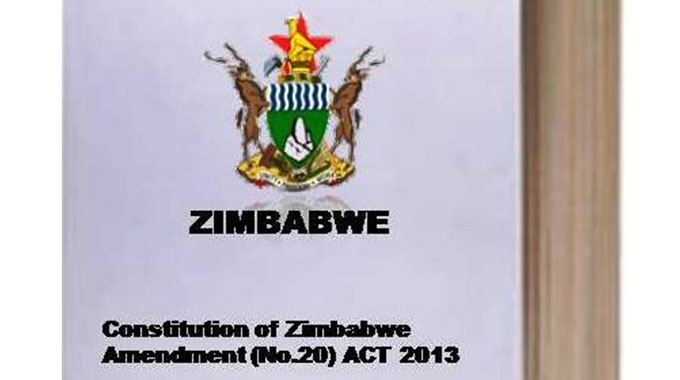The Second Constitutional Amendment

Sharon Hofisi Legal Letters
A constitution, written or unwritten, is a blueprint on various national aspects such as freedom, aspirations or governance issues.
Put simply, an amendment is an addition or alteration to a constitution. The process of amending a constitution is significant in any polity since the constitution serves as a blueprint on the vested will of the people who constitute a particular polity.
Zimbabwe adopted a home-grown constitution in 2013, which was first amended to enable the President of the Republic to handpick a chief justice and the judge president of the High Court.
Perhaps Zimbabweans across the constitutional divide still know how the Judicial Service Commission, the Law Society and one Romeo Zibani contributed to ensuring that the first constitutional amendment was done in a way that furthered the spirit of the constitution.
Even those who joined as friends of the court in the cases that were before the courts of law also played a key role in ensuring that the constitution was respected in terms of the appointment process on judges at that time.
After respecting the court process, the political party that ultimately succeeded in amending the constitution for the first time derived its powers from the constitution. Section 328 of the constitution of Zimbabwe, 2013, lays out the amendment procedures.
An amendment largely depends on the flexibility or rigidity of a constitution. Rigid constitutions are typically long, specific and require frequent amendments.
Some countries such as the United States of America (US) have constitutions that enjoy the benefits of rigidity and flexibility.
The US constitution is rigid in form, but flexible in substance.
This in essence means that it is difficult to amend, but is flexible enough to meet changing needs and times.
This perhaps explains why it has been amended about 26 or so times in more than 200 years.
Zimbabwe is a constitutional republic. Its political governance is built upon three pillars on unitary, democratic and sovereign Republic. The amendment process must also promote the three pillars as contemplated by the constitution. This is why parliamentarians, through representative democracy, may serve as the leading lights in the process.
The second amendment is set to deal with the provisions on devolution. Chapter 14 of the constitution spells out the factors on the desirability of devolution in Zimbabwe. The preamble to this chapter shows that devolution must not lead to disunity or secessionism.
It must be used to preserve national unity; promote democratic citizen participation in governance issues (political, economic and so forth); and must promote equitable allocation of national resources and the participation of local communities in the determination of developmental priorities within their areas.
The preamble also looks at devolution of powers and responsibilities to lower tiers of Government in Zimbabwe.
The lower tiers of Government are listed in Chapter 1 of the constitution to include provincial and metropolitan councils as well as local authorities such as urban and rural councils.
What occasioned the second amendment is the need to have both the executive and legislative arms of the State represented in lower tiers of Government.
The underlying reason is that Zimbabwe is not a federal State where lower tiers of Government may enjoy complete autonomy.
As a republican State, the executive and legislatures are part of the national Government.
They may, however, decide on the measures to enable them to maintain checks on the lower tiers of Government.
To limit on the executive excesses (which usually enjoys the benefits of the world of the judiciary (through appointment of judges) and the world of the legislature (through regulated presidential or ministerial participation), the executive can appoint an overseer who may not be actively involved in the running of the affairs of lower tier of Government.
The overseer may come in the form of a provincial minister in provincial councils.
Similarly, the legislature will also be represented by provincial councillors.
The councillors may be allocated specific or express powers through delegated legislation.
At the end of the day, an Act of Parliament that amends the Zimbabwean constitution for the second time must do so in express terms as envisaged by the constitution. It is argued in this article that the way the national Government will control lower tiers of Government must be based on the factors that are found in the preamble to chapter 14 of the constitution.
This will embed the purport, object and spirit of our Grundnorm.
In essence, the normative framework on economic and political governance must say yes to value-based political realism and no to Machiavellian antics.
Sharon Hofisi is a lecturer in Administrative law. feedback: [email protected]









Comments